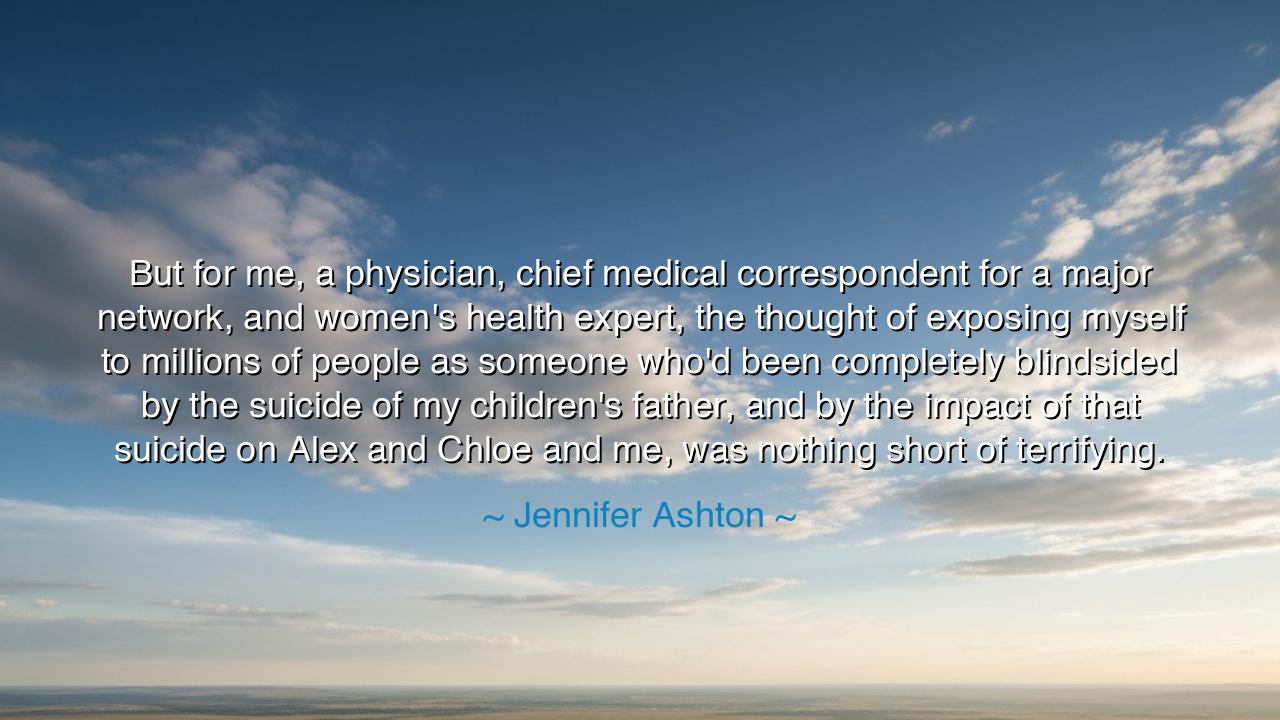
But for me, a physician, chief medical correspondent for a major
But for me, a physician, chief medical correspondent for a major network, and women's health expert, the thought of exposing myself to millions of people as someone who'd been completely blindsided by the suicide of my children's father, and by the impact of that suicide on Alex and Chloe and me, was nothing short of terrifying.






The words of Jennifer Ashton—“But for me, a physician, chief medical correspondent for a major network, and women's health expert, the thought of exposing myself to millions of people as someone who'd been completely blindsided by the suicide of my children's father, and by the impact of that suicide on Alex and Chloe and me, was nothing short of terrifying.”—rise like a confession carved into the heart. They are the words of one who has stood in the light of knowledge and yet been consumed by the darkness of grief. In them lies the sacred collision between professional strength and personal suffering, between the healer who speaks for others and the wounded soul who must now speak for herself. Ashton’s voice trembles not from weakness, but from the weight of truth: that even the learned and the strong can be undone by loss.
In this quote, Ashton, a respected physician and public figure, exposes the quiet war between the face we show the world and the wounds we carry in silence. To the eyes of many, she was a pillar of confidence—a doctor, a leader, a mother, a voice of science and reason. Yet behind the composure lay the shattered remains of a personal tragedy—the sudden suicide of her former husband, a man whose loss left not only questions but emotional ruins. The terror she speaks of is not just the fear of public exposure, but the deeper dread of vulnerability itself: the realization that knowledge and professionalism offer no armor against the most intimate pain.
There is an ancient echo in her confession. Hippocrates, the father of medicine, once wrote that “the physician must treat the body, but he too is made of flesh.” Long before him, the healers of Egypt, India, and Greece understood that those who ease the suffering of others often bear unseen burdens of their own. They carry the sorrow of their patients, the exhaustion of responsibility, and the silent shame of not being able to cure all. Ashton’s struggle mirrors that lineage—the wounded healer, a figure as old as healing itself. To stand before millions and admit one’s own grief is an act of courage as great as any surgery or diagnosis.
Her terror was also born of the expectations society places upon those in positions of authority. The doctor is supposed to be calm. The broadcaster must be composed. The expert must never falter. Yet when tragedy strikes, these roles collapse under the weight of human truth. Ashton’s words remind us that the physician’s robe does not protect against heartbreak, nor does fame offer insulation from despair. She speaks for all who have ever been expected to hold the world together while their own hearts broke quietly behind the scenes. And in that vulnerability lies her strength—for only those who have suffered deeply can speak with real empathy to the suffering of others.
History, too, bears witness to this paradox. Florence Nightingale, the “Lady with the Lamp,” brought comfort to soldiers in the dark fields of Crimea, but her own letters reveal nights of deep depression and exhaustion so severe that she could barely rise from bed. She healed others, even as she wrestled with her own frailty. So it is with Ashton: she continues to heal through words, through truth, through the power of her public voice, even as she acknowledges the wounds within her own spirit. Her openness becomes not a confession of weakness, but a gift—a lantern for others walking through the same shadow.
The deeper meaning of Ashton’s quote lies in the liberation that comes from vulnerability. To speak of pain, especially one born of suicide, is to break through the walls of shame that so often surround it. In baring her soul, Ashton offers a path of courage to others who grieve in silence, showing that healing begins not with perfection, but with honesty. Her terror of exposure becomes, in time, her transformation. What once threatened to destroy her now allows her to connect with thousands who have suffered similar loss. Through her, the wounded healer becomes the teacher—the one who turns suffering into understanding.
And so, the lesson we inherit from Jennifer Ashton’s truth is one of profound humanity: that it is not our titles or our expertise that make us whole, but our willingness to be seen in our brokenness. The physician, the leader, the parent—all are human first. To hide pain is to let it fester in darkness; to reveal it is to begin to heal. Let those who hear her words remember that strength is not the absence of suffering, but the courage to walk through it and speak of it. And may every soul who has known despair find in her example the ancient promise—that even from the deepest grief, one can rise again, not as who they were, but as someone more compassionate, more real, and more alive.






AAdministratorAdministrator
Welcome, honored guests. Please leave a comment, we will respond soon